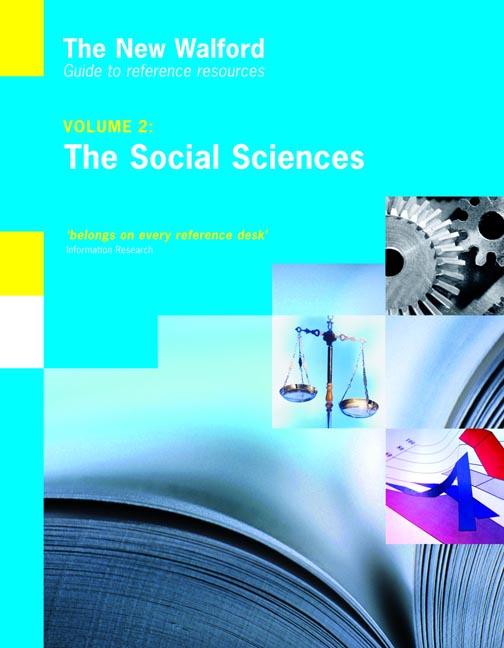Book contents
- Frontmatter
- Contents
- Preface
- Quick-start guide
- Editorial Board and Subject Specialists
- Introduction
- SOCIAL SCIENCES: GENERIC RESOURCES
- PSYCHOLOGY, SOCIOLOGY & SOCIAL WORK
- POLITICS, GOVERNMENT & LAW
- FINANCE, INDUSTRY & BUSINESS
- EDUCATION & SPORT
- MEDIA & INFORMATION
- TOOLS FOR INFORMATION PROFESSIONALS
- INDEXES
Preface
Published online by Cambridge University Press: 09 June 2018
- Frontmatter
- Contents
- Preface
- Quick-start guide
- Editorial Board and Subject Specialists
- Introduction
- SOCIAL SCIENCES: GENERIC RESOURCES
- PSYCHOLOGY, SOCIOLOGY & SOCIAL WORK
- POLITICS, GOVERNMENT & LAW
- FINANCE, INDUSTRY & BUSINESS
- EDUCATION & SPORT
- MEDIA & INFORMATION
- TOOLS FOR INFORMATION PROFESSIONALS
- INDEXES
Summary
In this second volume of The New Walford (TNW), we have continued the process of re-engineering ‘Walford’ for the 21st century network society. TNW is not conceptualized primarily as a tool to establish details of specific reference resources. All of us these days – or, at least, all who might also have access to this work – can readily use the web to do that. Rather, TNW Vol 2 principally is a carefully structured guide to examples of the various types of reference resource germane to communication in the social sciences. It is as much an encyclopedia as a resource discovery tool: of especial value – we trust – to students, information professionals and others new to some aspect of social science, and wanting an entrée to its literature.
Naturally, we have aimed to give a faithful description of the content and characteristics of the items chosen for citation. But not only subsequently will new editions have appeared, imprints changed, URLs moved, organizations discontinued, and so on; also, completely new resources will have arisen, supplementing or in some cases supplanting existing artefacts as the instruments of choice. So what we have here – as with any print tool – is a snapshot, the details planned to be accurate as at mid-2007.
Not surprisingly, we have toyed with the idea of updating the entries within this volume (and within the first volume of the series) online; or, indeed, of providing a web-searchable version of the whole of each volume's data. But further thought has convinced us that we should eschew such an approach. This, partly because there are already a number of well established generic web-based resource discovery tools for which TNW would be but a partial competitor (including, of course, Google itself!). Partly also, because we feel it very unlikely that we would be able to find enough information specialists willing and able optimally to maintain the currency of the online content, given the overall time, effort and funds that could reasonably be dedicated to the project. In our experience, so frequently human-intermediated webbased companions to, or versions of, print-based tools in the event turn out to be unsustainable. After the initial enthusiasm and flurry of activity, one soon finds the ‘last updated date’ on the website (if such be admitted) to be long ago. We would not want that.
- Type
- Chapter
- Information
- The New Walford Guide to Reference ResourcesSocial Sciences, pp. viiPublisher: FacetPrint publication year: 2007

